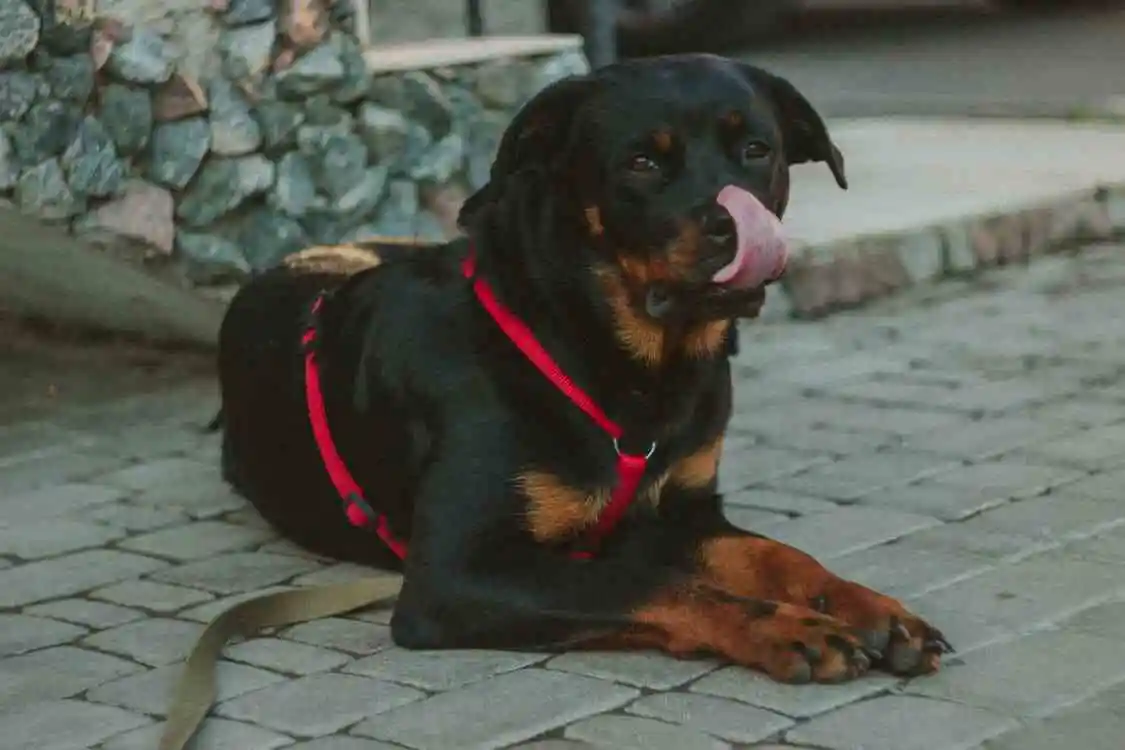Are Rottweilers aggressive? Answer is No. The Rottweiler breed gets a bad reputation as an aggressive dog, but this perception truly false.
Like any dog, individual Rottweiler temperaments also depending on care, training and socialization.
When I told my friends I wanted to adopt a Rottweiler, they thought I was crazy. “Aren’t they mean?” they asked.
Everything I’d heard made Rottweilers sound downright dangerous. But I had met George at the shelter, and I knew there was more to his story.
Are Rottweilers aggressive
Here is my story about Are Rottweiler aggressive.
Rottweilers (George) came from a bad situation. His first owner didn’t properly train or socialize him. George guarded his yard fiercely because that’s what he was taught to do.
But at the shelter, I saw his gentle, loving side. George was calm and affectionate with all the volunteers.
I was determined to give George the peaceful home he deserved. I enrolled us in training classes where he did beautifully. George listened to every command.
We visited the dog park regularly so he could meet new people and pups. George just wanted to make friends! At home, he was always content snoozing by my side.
Over time, even my skeptical buddies changed their minds about Rottweilers. They saw for themselves how George acted – polite, well-behaved and affectionate. It became clear his past issues were due to his first owner’s mistakes, not his breed.
All dogs can misbehave if not raised right, but with patience and training, many will blossom into wonderful companions.
How Do You Control Rottweilers Dog – Best Training Techniques
As a large, powerful breed, Rottweilers require consistent yet gentle training from a young age. Their size and strength mean poor behavior could inadvertently harm others if not addressed properly.
However, Rottweilers are also highly intelligent and motivated to please their owners when guided respectfully. Here are some positive techniques for teaching your Rottweiler good manners and control.
Start Socialization Early
Puppies absorb crucial social skills between 8-16 weeks. Begin exposing your Rottweiler puppy to a variety of friendly people, noises, places and situations while making it a positive experience.
With gentle praise and treats, associate these encounters with something good. Early socialization helps Rottweilers grow into calm, confident adults comfortable in any environment under control.
Focus on the Basics
Master simple commands like “sit”, “stay”, “come” and “leave it” before moving on to tricks. Keep sessions short at first, just 5-10 minutes, using small pieces of kibble or praise as reward.
Be patient – Rottweilers can be stubborn but respond well to consistency. Repetition is key, practice daily without punishment for mistakes, building your dog’s desire to obey through positive reinforcement alone.
Leash Training is Vital
Attach a well-fitted collar or harness then hold treats close to your Rottweiler’s nose to lure them into a sit. Slowly move forward, stopping as they sit to take gentle tugs on the leash. Reward any obedience to prevent pulling.
Carry treats for on-leash praise and to call them back if distracted. Regular walks are good exercise while reinforcing your leadership through polite leash manners.
Curb Excitable Behavior
Rottweilers tend to jump from sheer enthusiasm. Ignore hyper behavior but reward calm with affection. Teach the command “off” to have them back up from guests.
Carry treats handy for instant conditioning that sitting calmly gets attention, not zoomies. Remaining patient, consistent and non-reactive helps curtail excess energy through positive means.
Instruct Proper Greetings
On walks, avoid direct contact between your Rottweiler and strangers until instructed. Teach them to sit calmly by your side for a treat while exchanging pleasantries with passersby. With practiced, this social etiquette translates to any setting and builds respect for your guidance in public.
Establish Boundaries
Prevent counter-surfing, furniture-jumping or mouthing with a calm “leave it” or down command, rewarding compliance. For door manners, have them sit before opening/closing and refrain from rewarding with attention until invited.
Clear, consistent house rules channel Rottweilers focus onto pleasing their leader through cooperation.
Never Punish Mistakes
While Rottweilers benefit from structure, punishment suppresses natural behaviors without offering alternatives and risks damage to the bond of trust. Make sure his dog collar is not so much tight.
Stay solutions-oriented through patience and positive reinforcement, breaking tasks into smaller achievements gradually mastered using play, praise and treats. Firm kindness earns their devoted respect.
Ongoing Training is Lifelong
Maintenance is key for control as big breeds mature – brush up on commands weekly and find tasks like fetch they enjoy. Well-trained Rottweilers thrive as attentive companions when their owners commit long-term to their mental, physical and social needs through humane leadership founded on mutual trust and respect. Kindness yields the best results.
Is Rottweiler a good breed for dog training?
Rottweiler is the most intelligent breeds of dogs. Their problem-solving skills and ability to learn and retain commands makes them suited for complex training routines.
Rottweilers can have very high focus, especially one-on-one with their handler. This attentiveness serves them well during intensive training sessions where focus is crucial.
How often should I walk with my Rottweiler?
Here are some guidelines for how often to walk a Rottweiler:
- Puppies (Like under 1 year): 3 to 4 walks per day for 15-30 minutes each. Multiple shorter walks are better than one or two long walks.
- Young adults (Like 1-3 years): 2 walks per day for 30-60 minutes each. Rottweilers are still growing and active at this age. The walks should include play, training, and mental stimulation.
- Mature adults (>3 years): 1-2 walks per day of 30-60 minutes. Fully grown Rottweilers have less need for intense activity but still require regular exercise. Two walks are recommended if your dog seems under-stimulated.
- Always adjust based on your individual dog. Signs they need more exercise include excess energy, barking, chewing, etc. Consult your vet if necessary.
- Never leave a Rottweiler unattended in the yard for exercise. They require human companionship and engagement on their walks.
